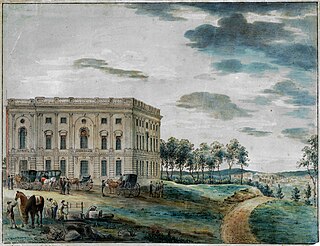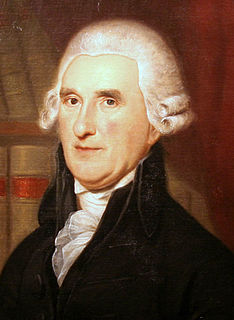This page is based on this
Wikipedia article Text is available under the
CC BY-SA 4.0 license; additional terms may apply.
Images, videos and audio are available under their respective licenses.

The Seventh United States Congress was a meeting of the legislative branch of the United States federal government, consisting of the United States Senate and the United States House of Representatives. It met in Washington, D.C. from March 4, 1801, to March 4, 1803, during the first two years of Thomas Jefferson's presidency. The apportionment of seats in the House of Representatives was based on the First Census of the United States in 1790. Both chambers had a Democratic-Republican majority, except during the Special session of the Senate, when there was a Federalist majority in the Senate.

The Decapoda or decapods are an order of crustaceans within the class Malacostraca, including many familiar groups, such as crayfish, crabs, lobsters, prawns, and shrimp. Most decapods are scavengers. The order is estimated to contain nearly 15,000 species in around 2,700 genera, with around 3,300 fossil species. Nearly half of these species are crabs, with the shrimp and Anomura including hermit crabs, porcelain crabs, squat lobsters making up the bulk of the remainder. The earliest fossil decapod is the Devonian Palaeopalaemon.

The longhorn beetles are a cosmopolitan family of beetles, typically characterized by extremely long antennae, which are often as long as or longer than the beetle's body. In various members of the family, however, the antennae are quite short and such species can be difficult to distinguish from related beetle families such as the Chrysomelidae. The family is large, with over 26,000 species described, slightly more than half from the Eastern Hemisphere. Several are serious pests. The larvae, called roundheaded borers, bore into wood, where they can cause extensive damage to either living trees or untreated lumber. A number of species mimic ants, bees, and wasps, though a majority of species are cryptically colored. The rare titan beetle from northeastern South America is often considered the largest insect, with a maximum known body length of just over 16.7 cm (6.6 in).
The scientific name of this beetle family goes back to a figure from Greek mythology: after an argument with nymphs, the shepherd Cerambus was transformed into a large beetle with horns.

Cucujoidea is a superfamily of beetles. They include many fungus beetles, as well as lady beetles. Also included are a diversity of lineages of "bark beetles" unrelated to the "true" bark beetles (Scolytinae), which are weevils.

Bostrichoidea is a superfamily of beetles. It is the type superfamily of the infraorder Bostrichiformia.

Cleroidea is a small superfamily of beetles. Most of the members of the group are somewhat slender, often with fairly soft, flexible elytra, and typically hairy or scaly.

A sister republic was a republic established by French armies or by local revolutionaries and assisted by the First French Republic during the French Revolutionary Wars.

The 1802 United Kingdom general election was the election to the House of Commons of the second Parliament of the United Kingdom. It was the first to be held after the Union of Great Britain and Ireland. The first Parliament had been composed of members of the former Parliaments of the Kingdom of Great Britain and the Kingdom of Ireland.
The Battle of Poona took place on 25 October 1802 near Pune between the rival factions of the Maratha Confederacy. The forces of the Scindia (Shinde) and the Peshwa Bajirao II were attacked by the Holkars. While the British East India Company was not involved in the battle, its outcome and aftermath led to the Second Anglo-Maratha War.
The United States Congress passed the Naturalization Law of 1802 on April 14, 1802. The 1802 act replaced the Naturalization Act of 1798, and provided:

Events from the year 1802 in the United States.
The United States Senate elections of 1802 and 1803 were elections for the United States Senate which had the Democratic-Republican Party assume an overwhelming control thereof.

The Pennsylvania gubernatorial election of 1802 occurred on November 2, 1802. Incumbent Democratic-Republican governor Thomas McKean successfully sought re-election to another term. As occurred in his prior campaign, he defeated U.S. Senator James Ross, a Federalist.

South Carolina increased its apportionment from 6 seats to 8 after the 1800 census.

The 1802 United States Senate election in Pennsylvania was held on December 14, 1802. Samuel Maclay was elected by the Pennsylvania General Assembly to the United States Senate.
The 1802 United States elections occurred in the middle of Democratic-Republican President Thomas Jefferson's first term, during the First Party System. Members of the 8th United States Congress were chosen in this election. Democratic-Republicans picked up several seats in both chambers of Congress, solidifying their control over the House and Senate.












